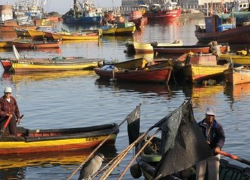
About a month ago, the International Court of Justice at the Hague (“ICJ”) issued a ruling in a dispute between Peru and Chile that was instigated in 2008. Over 14,000 square miles of ocean in international waters were at stake. The ruling granted Peru control over the majority of the disputed waters, but Chile retained some of the most fertile fishing waters. Peru and Chile are the world’s largest exporters of fish, making it a primary economic resource for both countries. Peruvians consider the ICJ ruling an opportunity to gain national pride and redemption after being defeated in the War of the Pacific over a century ago.
While Peru filed the action in 2008, this dispute reaches back to the 19th century. The War of the Pacific centered on a conflict over the nitrate industry, which resulted in a Chilean victory over both Peru and Bolivia. This gave Chile the power to annex coastal provinces. The War of the Pacific created uncertainty regarding coastal boundaries that continued into the 20th Century.
A maritime boundary was partially created in 1952 upon the signing of the Santiago Declaration. The Declaration’s purpose was to establish sovereignty and exclusive jurisdiction over the waters that are adjacent to Peru, Chile, and Ecuador. The initial concern involved problems with whaling fleets that threatened the resources in the area. However, some 30 years later, Peru took the position that the maritime territory was not adequately defined.
In 1986, four years after the U.N. Convention on the Law of the Sea went into effect, Peru visited Chile with the intent of re-negotiating the water territories. Chile was uncooperative and was not amenable to negotiation, which led to this suit in the ICJ. Peru asked the ICJ to define the maritime border between Peru and Chile based on the criteria of equidistance in the contested area. Chile contended that the border should extend parallel to the equator. Because of these disagreements, Peru wanted the ICJ to legally define both countries’ maritime territory.
The ICJ’s ruling, which cannot be appealed, struck a balance between the two countries’ arguments by announcing that a parallel border already existed that extended 80 nautical miles to the equator, and then the ICJ “drew a line southwest to where the countries’ 200-mile territorial waters end.” While the ICJ largely agreed with Peru’s position, Chile retained much of the fishing territory. Chile is still concerned, however, about the effect the decision will have on its fishing industry. Peru’s victory is primarily a “symbolic one: for the first time it has won a battle with Chile, and it has done so by peaceful, legal means and through professional diplomacy.” Because Chile retains much of the fruitful waters, there is promise that relations between the two countries will improve. However, Peru remains apprehensive with regard to whether Chile will enforce the ruling adequately and still expects protesting from Chilean citizens. While some Chilean fishermen have protested in a northern port, protests have not been overwhelming so far and local authorities have been able to control the aftermath.
Lydia Rice is a 3L and Candidacy Editor of the Denver Journal of International Law & Policy

